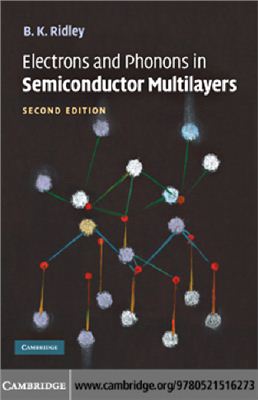Cambridge University Press; 2 edition, 2009, 409 pages
Advances in nanotechnology have generated semiconductor structures that are only a few molecular layers thick, and this has important consequences for the physics of electrons and phonons in such structures. This book describes in detail how confinement of electrons and phonons in quantum wells and wires affects the physical properties of the semiconductor. This second edition contains four new chapters on spin relaxation, based on recent theoretical research; the hexagonal wurtzite lattice; nitride structures, whose novel properties stem from their spontaneous electric polarization; and terahertz sources, which includes an account of the controversies that surrounded the concepts of Bloch oscillations and Wannier-Stark states. The book is unique in describing the microscopic theory of optical phonons, the radical change in their nature due to confinement, and how they interact with electrons. It will interest graduate students and researchers working in semiconductor physics.
Advances in nanotechnology have generated semiconductor structures that are only a few molecular layers thick, and this has important consequences for the physics of electrons and phonons in such structures. This book describes in detail how confinement of electrons and phonons in quantum wells and wires affects the physical properties of the semiconductor. This second edition contains four new chapters on spin relaxation, based on recent theoretical research; the hexagonal wurtzite lattice; nitride structures, whose novel properties stem from their spontaneous electric polarization; and terahertz sources, which includes an account of the controversies that surrounded the concepts of Bloch oscillations and Wannier-Stark states. The book is unique in describing the microscopic theory of optical phonons, the radical change in their nature due to confinement, and how they interact with electrons. It will interest graduate students and researchers working in semiconductor physics.

